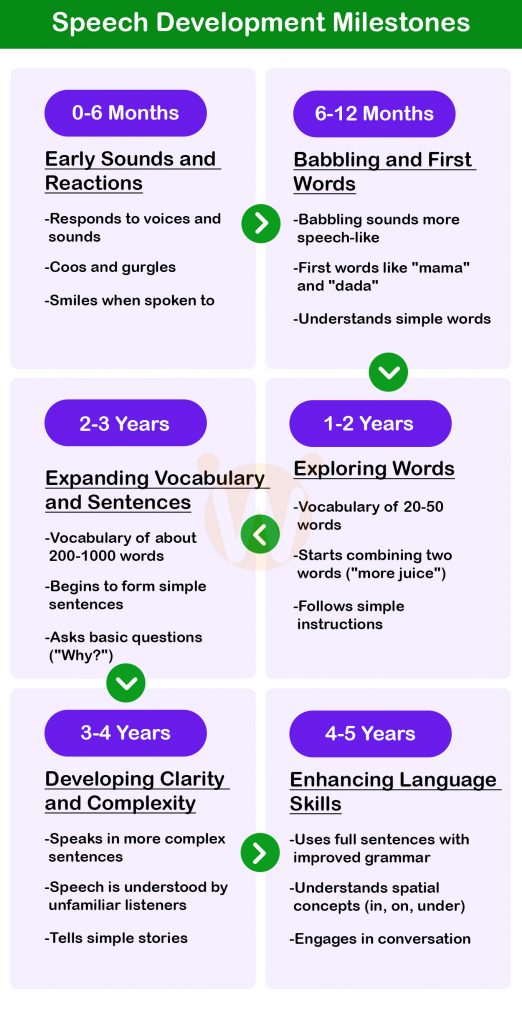Improve Child Speech Clarity: Tips, Games & Milestones
Last Updated: January 25, 2025
Helping your child improve their speech clarity is crucial for their overall development. Clear speech allows them to express thoughts and emotions effectively, build strong relationships, and succeed in school. When children speak clearly, they gain confidence, engage better in class, and navigate social interactions with ease. In this guide, we’ll share simple, practical strategies to support your child’s speech development through everyday activities, games, and expert-recommended tips.
Discover How Online Speech Therapy Can Help Your Child. Book Your Free Consultation Today!
Book Your Free ConsultationUnderstanding Speech Development

Typical Speech Sound Milestones by Age
It’s important to understand that children develop speech sounds at their own pace. However, there are general milestones that can guide you in knowing what to expect at different ages when it comes to speech clarity. Here’s a quick overview:
- Age 2: By this age, most children can pronounce sounds like /b/, /n/, /m/, /p/, /h/, /w/, and /d/. You might notice your child using these sounds in simple words and beginning to form short sentences.
- Age 3: At this stage, children usually start to master sounds such as /g/, /k/, /f/, /t/, “ng,” and “y.” Their vocabulary expands, and they begin to string more words together, making their speech more understandable.
- Age 4: By four, children typically pronounce more complex sounds like /v/, /s/, /l/, /z/, “sh,” “ch,” and “j.” Their sentences become longer and more detailed, showing significant progress in speech clarity.
- Age 5: By the age of five, children should be able to produce nearly all speech sounds, including /r/, “dz,” the voiced “TH” (as in “that”), and the voiceless “TH” (as in “thin”). Their speech should be clear enough to be understood by unfamiliar listeners most of the time.
Understanding these milestones can help you gauge your child’s speech development and recognize if they are on track or might need additional support.
Also read: Speech and Language Milestones: 0 to 12 Months
Signs That Your Child Might Need Additional Support
While it’s normal for children to make mistakes as they learn to speak, certain signs may indicate that they need extra help to achieve speech clarity. If your child consistently struggles with speech sounds appropriate for their age, or if their speech is difficult for others to understand, it may be time to consider professional support. Here are some signs to watch for:
- Difficulty with Age-Appropriate Sounds: If your child cannot pronounce sounds that their peers have mastered, this could be a sign of a speech delay. For example, if a three-year-old still struggles with /b/, /n/, or /m/ sounds, it might be worth discussing with a professional.
- Frustration When Communicating: Notice if your child gets frustrated or upset when trying to communicate. This frustration can stem from not being understood or from struggling to form words correctly.
- Limited Vocabulary: While every child develops at their own pace, a noticeably limited vocabulary for their age can be a red flag.
- Frequent Mispronunciations: Regularly replacing sounds (e.g., saying “doe” instead of “go”) or distorting words can indicate a speech sound disorder.
- Difficulty Being Understood by Others: If family members and friends often have trouble understanding your child, it might be time to seek a speech evaluation.
Read Aloud Together

Reading aloud with your child is one of the most effective ways to enhance their language development. It’s a fun, interactive activity that not only strengthens your bond but also introduces your child to new words and sounds, helping them speak more clearly.
Benefits of Reading for Language Development
Reading aloud offers numerous benefits for your child’s speech and language development. It helps:
- Expand Vocabulary: Exposing your child to a variety of words through stories broadens their vocabulary.
- Improve Pronunciation: Hearing you pronounce words correctly helps your child learn the correct way to say them.
- Enhance Comprehension: Listening to stories improves your child’s understanding of language structure and context.
- Boost Listening Skills: It teaches your child to pay attention, listen carefully, and understand spoken language.
Tips for Selecting Books
Choosing the right books can make a significant difference in how much your child enjoys reading and how much they benefit from it:
- Colorful Pictures: Books with bright, engaging illustrations help keep your child interested and provide visual context for new words.
- Simple Words: Start with books that use simple, easy-to-understand language. This makes it easier for your child to follow along and learn new words.
- Repetitive Phrases: Books with repetitive text can help reinforce language patterns and make it easier for your child to remember and repeat words.
Simplify Speech Therapy At Home With Tools Crafted For Parents And Caregivers. Start Exploring Today!
View ResourcesHow to Read Effectively
To get the most out of reading aloud with your child, consider these tips:
- Read Slowly: Take your time to pronounce each word clearly. This helps your child hear how words should sound.
- Be Expressive: Use different voices for different characters and emphasize emotions. This makes the story more engaging and helps your child understand the meaning behind the words.
- Encourage Participation: Ask your child to point to pictures, repeat phrases, or predict what happens next. This interaction keeps them engaged and reinforces learning.
- Discuss the Story: After reading, talk about the story. Ask questions like, “What was your favorite part?” or “What do you think will happen next?” This encourages your child to think about and use the language they’ve just heard.
Encourage Self-Expression
Importance of Letting Children Speak for Themselves
Encouraging your child to speak for themselves is crucial for their language development and confidence. When children express their thoughts and ideas, they practice using language in meaningful ways. This practice helps them improve their speech clarity, vocabulary, and overall communication skills. Allowing children to speak for themselves also fosters independence and self-esteem, as they learn that their voice and opinions matter.
Techniques for Encouraging Speech
Here are some effective techniques to encourage your child to speak more and improve their language skills:
- Listening Attentively: Show your child that you are interested in what they have to say by giving them your full attention. Make eye contact, nod, and respond to their comments. This reinforces their efforts and encourages them to continue speaking.
- Responding Positively: Always respond to your child’s attempts to communicate, even if their speech isn’t perfect. Praise their efforts and provide gentle corrections when needed. For example, if they say “I goed to the park,” you can respond with, “You went to the park? That sounds fun!” This reinforces the correct form without discouraging them.
- Encouraging Practice: Create opportunities for your child to speak. Ask them to tell you about their day, describe a favorite toy, or narrate a story. The more they practice, the more confident and clear their speech will become.
Asking Open-Ended Questions to Expand Vocabulary
Open-ended questions are a great way to encourage your child to speak more and use a wider range of vocabulary, enhancing their speech clarity. These questions cannot be answered with a simple “yes” or “no” and require more thought and language use. Here are some examples:
- “What did you do at the park today?”: This prompts your child to describe their activities, helping them practice past tense and descriptive language.
- “Can you tell me about your favorite story?”: This encourages them to recall details and practice narrative skills.
- “How do you feel about your new toy?”: This helps them express emotions and opinions, expanding their emotional vocabulary.
By regularly asking open-ended questions, you help your child think critically and articulate their thoughts more clearly.
Use Clear and Simple Language
How to Communicate Effectively with Young Children
Communicating effectively with young children is crucial for their speech and language development. Using clear and simple language helps them understand better and encourages them to mimic your speech patterns. Here are some key tips:
- Be Direct and Simple: Use straightforward language and short sentences to convey your message. This makes it easier for children to grasp and remember what you’re saying.
- Speak Slowly and Clearly: Articulate your words carefully and maintain a steady pace. This allows children to catch each word and sound, aiding their learning process.
- Repeat Key Words: Repetition reinforces learning. Repeat important words and phrases to help your child remember and understand them better.
- Use Gestures and Facial Expressions: Non-verbal cues like gestures and facial expressions can help clarify your message and keep your child engaged.
Examples of Simplifying Speech
Using simpler language doesn’t mean dumbing down your speech; it’s about making communication clear and effective. Here are some examples:
- Short Sentences: Instead of saying, “We need to get ready to go to the grocery store to buy some food,” say, “Let’s get ready to buy food.” This reduces complexity and helps your child focus on the main action.
- Avoiding Complex Words: Replace complex words with simpler alternatives. For example, instead of saying, “That’s fascinating,” say, “That’s interesting.” This makes it easier for your child to understand and use the word themselves.
- Concrete Language: Use specific, concrete terms rather than abstract ones. For example, instead of saying, “Be careful with that,” say, “Hold the cup with both hands so it doesn’t spill.”
- Use Names: Instead of pronouns, use names to avoid confusion. For example, say, “Daddy is going to work,” instead of, “He is going to work.”
Learn more: Is It Speech Delay or Autism? Understanding Your Child’s Communication Development
Be a Role Model
The Impact of Adult Speech on Children’s Learning
Children are like sponges when it comes to language learning—they absorb much of what they hear from the adults around them. The way you speak directly influences your child’s speech development. When children hear clear, well-articulated speech, they are more likely to mimic these patterns. This is why it’s crucial for parents and caregivers to be conscious of their speech, as it serves as a model for their children to follow.
Tips for Modeling Clear Speech
Here are some effective ways to model clear speech for your child:
- Speak Slowly: When you speak slowly, it gives your child the chance to hear each sound and word distinctly. This helps them understand how words are formed and pronounced.
- Enunciate Words: Make sure to articulate each part of a word clearly. For example, say “butterfly” instead of “budderfly.” Clear enunciation helps your child learn the correct way to pronounce words.
- Use Correct Grammar: Children learn grammar from listening to adults. Use proper sentence structures and correct any grammatical mistakes you might hear in your speech or theirs.
- Repeat Key Phrases: Repetition reinforces learning. Use key phrases frequently to help your child become familiar with the correct pronunciation and usage of words.
Encouraging Repetition and Practice
Encouraging your child to repeat words and phrases after you is a powerful way to improve their speech clarity. Here are some strategies to make repetition and practice more effective:
- Interactive Games: Play games that involve repeating words or phrases. For instance, games like “Simon Says” can be both fun and educational.
- Daily Routines: Incorporate repetition into daily routines. For example, ask your child to name the items they see during a grocery store visit or describe the steps while brushing their teeth.
- Positive Reinforcement: Praise your child when they attempt to repeat words or phrases correctly. Positive reinforcement boosts their confidence and encourages them to keep practicing.
- Storytelling: Encourage your child to retell stories or events. This not only helps with repetition but also enhances their narrative skills and vocabulary.
By being a role model in speech, you set a positive example for your child to follow. Your clear and well-articulated speech provides them with a blueprint for their own speech development, making it easier for them to learn and practice speaking clearly.
Play Word Games
Examples of Effective Word Games
Incorporating word games into your child’s routine can be a fun and effective way to enhance their speech clarity and vocabulary. Here are a couple of popular games to get you started:
- I Spy: This classic game involves one person selecting an object within view and giving a clue such as, “I spy with my little eye, something that is green.” The other players then guess the object. This game helps children practice descriptive language and vocabulary.
- Simon Says: In this game, one person (Simon) gives commands like “Simon says touch your nose.” Players should only follow the command if it starts with “Simon says.” This game encourages listening skills and clear speech as children follow and repeat commands.
Benefits of Word Games for Speech Clarity and Vocabulary
Word games offer several benefits for your child’s speech and language development:
- Improved Vocabulary: Playing word games introduces new words and concepts, expanding your child’s vocabulary.
- Better Pronunciation: Repeating words and phrases during games helps children practice and improve their pronunciation.
- Enhanced Listening Skills: Games like Simon Says require careful listening, which can improve your child’s ability to understand and follow spoken instructions.
- Increased Engagement: Word games make learning interactive and enjoyable, which can motivate children to participate more actively in language practice.
How to Incorporate Games into Daily Routines
Making word games a regular part of your daily routine can be simple and seamless. Here are some tips on how to do it:
- During Car Rides: Use travel time to play games like I Spy. Describe objects you see along the way, and encourage your child to do the same.
- At Meal Times: Engage your child in word games during meals. For example, you can play a quick round of Simon Says while waiting for food to be served.
- Before Bedtime: Incorporate word games into your bedtime routine. After reading a story, play a game that relates to the book’s content to reinforce new vocabulary.
- While Doing Chores: Turn mundane tasks into opportunities for language practice. For instance, you can play a game of “name that object” while tidying up toys or setting the table.
By integrating word games into your everyday activities, you provide your child with numerous opportunities to practice speaking clearly and expand their vocabulary in a fun and engaging way.
Effective Word Games
| Word Game | Description | Skills Improved |
|---|---|---|
| I Spy | Players take turns spotting objects and giving clues about them. One player says, “I spy with my little eye, something that is [color/shape].” The other players guess the object. | Vocabulary, Descriptive Skills |
| Simon Says | One player (Simon) gives commands starting with “Simon says,” and the other players must follow the command. If a command is given without “Simon says,” players should not follow it. | Phonological Awareness |
| Rhyming Games | Players think of words that rhyme with a given word. For example, if the word is “cat,” players might say “bat,” “hat,” or “rat.” | Listening, Pronunciation |
| Alphabet Games | Players identify or think of words starting with a specific letter. This can be done by looking around the room and naming objects or by brainstorming words. | Letter Recognition, Vocabulary |
Enjoy Music Together
Role of Music and Nursery Rhymes in Language Learning
Music and nursery rhymes play a significant role in language development for young children. They combine rhythm, melody, and repetition, which make it easier for children to learn and remember words and phrases. Singing songs and reciting rhymes can help children improve their vocabulary, pronunciation, and understanding of language patterns. The repetitive nature of music and rhymes reinforces language learning and makes it a fun and engaging process for kids.
Examples of Songs and Rhymes to Sing Together
Incorporating songs and nursery rhymes into your daily routine can be a delightful way to enhance your child’s speech clarity. Here are some popular examples:
- “Twinkle, Twinkle, Little Star”: This classic nursery rhyme helps children learn about the rhythm and rhyme of language. The simple words and repetitive structure make it easy for kids to follow along and sing.
- “The Wheels on the Bus”: This song introduces children to various actions and sounds, encouraging them to mimic movements and words. It’s great for interactive learning and practicing new vocabulary.
- “Old MacDonald Had a Farm”: This song teaches animal names and sounds, helping children associate words with their corresponding sounds. The repetitive chorus makes it easy for kids to join in.
- “If You’re Happy and You Know It”: This action song encourages children to follow instructions and express emotions through words and movements. It’s an excellent way to practice listening and speaking skills.
Making Learning Fun Through Music
Music can transform language learning into a fun and enjoyable experience. Here are some tips on how to make the most of musical activities with your child:
- Sing Along Together: Make singing a regular part of your daily routine. Sing songs during car rides, bath time, or while doing chores. This consistent exposure helps reinforce language learning.
- Use Instruments: Incorporate simple musical instruments like tambourines, maracas, or drums. Playing instruments along with singing can enhance your child’s understanding of rhythm and beat, which are important for language development.
- Create Your Own Songs: Encourage creativity by making up new songs together. Use familiar tunes and add your own words. This activity not only makes learning fun but also allows your child to practice creating sentences and using new vocabulary.
- Interactive Movements: Pair songs with actions or dance moves. This combination of music and movement can help children remember words and phrases better. For example, act out “The Wheels on the Bus” by moving your arms like windshield wipers or pretending to honk the horn.
By enjoying music together, you create a playful and supportive environment for your child’s speech development. Music not only makes learning more enjoyable but also helps children develop essential language skills in a natural and engaging way.
Tell Stories
Benefits of Storytelling for Language Development
Storytelling is a powerful tool for language development. It helps children enhance their vocabulary, understand sentence structures, and improve their listening and speaking skills. When children listen to stories, they are exposed to new words and ideas, which broadens their language comprehension. Additionally, storytelling encourages imagination and creativity, allowing children to express themselves more vividly and clearly.
Tips for Engaging Storytelling Sessions
To make storytelling sessions more engaging and beneficial for your child’s speech development, consider the following tips:
- Bedtime Stories: Incorporate storytelling into your bedtime routine. This not only helps your child relax but also provides a regular opportunity for language practice.
- Character Voices: Use different voices for different characters. This makes the story more exciting and helps your child understand the emotions and actions of each character. It also encourages them to experiment with their own speech.
- Interactive Storytelling: Ask your child questions about the story as you read. For example, “What do you think will happen next?” or “Why did the character do that?” This keeps them engaged and encourages them to think critically about the story.
- Visual Aids: Use books with colorful illustrations or even props to make the story come alive. Visuals help children connect words with images, reinforcing their understanding and memory.
Encouraging Children to Retell Stories to Practice Speech
After listening to a story, encourage your child to retell it in their own words. This practice helps improve their narrative skills, memory, and speech clarity. Here’s how you can do it:
- Simple Prompts: Start with simple prompts like “Can you tell me what happened in the story?” or “What was your favorite part?” Gradually, ask for more details to encourage them to elaborate.
- Role-Playing: Engage in role-playing games where your child acts out parts of the story. This makes the activity fun and interactive, while also providing a natural way for them to practice speaking clearly.
- Praise and Encouragement: Always praise their efforts and gently guide them if they struggle. Positive reinforcement builds their confidence and motivates them to keep practicing.
Ask Questions with Choices
How to Use Choice Questions to Encourage Clear Speech
Asking choice questions is a simple yet effective way to encourage your child to speak clearly. These questions give your child the opportunity to hear and repeat the options you provide, which helps with pronunciation and decision-making. Here’s how you can use choice questions effectively:
- Clear Options: Offer two clear and distinct choices. For example, “Do you want an apple or a banana?” This helps your child focus on pronouncing the words correctly and making a decision.
- Encourage Full Sentences: Prompt your child to answer in full sentences rather than one-word responses. For example, instead of just saying “apple,” encourage them to say, “I want an apple.”
Examples of Choice Questions to Practice Pronunciation and Decision-Making
Here are some examples of choice questions that you can use to help your child practice speaking clearly:
- At Mealtime: “Would you like milk or juice with your breakfast?” Encourage your child to respond with, “I would like juice, please.”
- During Playtime: “Do you want to play with blocks or cars?” Have them say, “I want to play with blocks.”
- While Getting Dressed: “Do you want to wear the red shirt or the blue shirt?” They can practice saying, “I want to wear the red shirt.”
By regularly using choice questions, you provide your child with frequent opportunities to practice their speech in a structured and supportive way. This method helps improve their clarity and confidence in speaking.
Choice Questions Examples
| Situation | Question | Practice Area |
|---|---|---|
| Mealtime | “Do you want milk or juice?” | Pronunciation, Decision-Making |
| Playtime | “Do you want to play with blocks or cars?” | Vocabulary, Decision-Making |
| Getting Dressed | “Do you want the red shirt or the blue shirt?” | Color Recognition, Pronunciation |
Limit Screen Time
Balancing Screen Time with Human Interaction
In today’s digital age, it’s easy for children to spend a significant amount of time on screens, whether it’s watching TV, playing video games, or using tablets and smartphones. While some screen time can be educational, balancing it with human interaction is crucial for your child’s language development. Face-to-face interactions provide opportunities for children to practice speaking, listening, and understanding social cues, which are essential for effective communication.
Explore more on Virtual Autism: Things that you need to know
Importance of Socialization for Language Skills
Socialization plays a key role in developing language skills. When children interact with others, they learn to use language in context, understand different speech patterns, and pick up on non-verbal cues like facial expressions and body language. These interactions help children develop a richer vocabulary and better grammar. Additionally, socializing with peers and adults teaches children how to engage in conversations, take turns speaking, and listen actively.
Creating Opportunities for Face-to-Face Conversations
Here are some practical ways to encourage face-to-face interactions and reduce screen time:
- Family Time: Dedicate specific times of the day for family activities that do not involve screens. For example, have dinner together and engage in meaningful conversations. Ask your child about their day, share stories, and discuss various topics to keep them talking and listening.
- Playdates: Arrange playdates with other children. This gives your child the chance to interact with peers, practice social skills, and learn from each other.
- Outdoor Activities: Encourage outdoor play. Activities like playing in the park, riding bikes, or participating in sports provide natural opportunities for children to communicate and collaborate with others.
- Storytelling Sessions: Host regular storytelling sessions where each family member takes turns telling a story. This not only enhances language skills but also makes for a fun and engaging family activity.
- Limit Screen Use During Certain Times: Establish rules for screen use, such as no screens during meals or before bedtime. Encourage alternative activities like reading, drawing, or playing board games that promote interaction and communication.
Balancing screen time with human interaction is essential for your child’s language development. By creating more opportunities for face-to-face conversations, you help your child practice and improve their speech and social skills in a natural and enjoyable way.
Conclusion
Helping your child develop clear speech is a journey that requires patience, practice, and positive reinforcement. Remember the key strategies we discussed: read aloud together, encourage self-expression, use clear and simple language, be a role model, play word games, give positive feedback, enjoy music together, tell stories, ask questions with choices, and limit screen time. These activities will help your child improve their speech clarity and confidence. Consistency is important, so try to practice these strategies regularly and celebrate your child’s progress, no matter how small.
Clear speech is very important for your child’s growth. It helps them express their thoughts, make friends, and do well in school. Good communication skills will benefit them throughout their life, from talking in class to forming friendships and succeeding in their careers. By working on their speech now, you are helping them for the future. For more tips and resources, visit Wellness Hub. Wellness Hub offers the guidance and tools you need to support your child’s speech development.
Frequently Asked Questions:
1. How can I help my child speak more clearly?
To help your child speak more clearly, engage in activities such as reading aloud together, encouraging self-expression, using clear and simple language, being a speech role model, playing word games, giving positive feedback, enjoying music together, telling stories, asking questions with choices, and limiting screen time. These strategies promote language development and improve speech clarity.
2. What are some effective word games to improve my child’s speech clarity?
Effective word games to improve your child’s speech clarity include “I Spy” and “Simon Says.” These games enhance vocabulary, pronunciation, and listening skills while making learning fun and interactive.
3. Why is positive reinforcement important in speech development?
Positive reinforcement is important because it boosts your child’s confidence and motivates them to practice more. Praising their efforts and gently correcting their speech encourages them to keep trying and improves their speech clarity over time.
4. How does reading aloud help my child’s language development?
Reading aloud helps your child by expanding their vocabulary, improving pronunciation, and enhancing listening skills. It also fosters a love for reading and provides a bonding experience that makes learning enjoyable.
5. What role does music play in helping children learn to speak clearly?
Music, especially songs and nursery rhymes, helps children learn new words and sounds through rhythm and repetition. Singing together makes learning fun and reinforces language patterns, improving speech clarity.
6. How can storytelling improve my child’s speech?
Storytelling enhances language development by exposing children to new words and sentence structures. Encouraging your child to retell stories helps them practice speaking clearly and improves their narrative skills.
7. How can I use questions to help my child practice speaking?
Using choice questions like “Do you want an apple or a banana?” helps your child practice pronunciation and decision-making. Encourage them to answer in full sentences to further improve their speech clarity.
8. Why is it important to balance screen time with human interaction?
Balancing screen time with human interaction is important because face-to-face conversations provide opportunities for children to practice speaking, listening, and understanding social cues, which are essential for language development.
9. What are some tips for being a good speech role model for my child?
To be a good speech role model, speak slowly, enunciate words clearly, use correct grammar, and encourage your child to repeat and practice words and phrases. Your clear speech provides a blueprint for their language development.
10. When should I seek professional help for my child’s speech development?
If your child consistently struggles with age-appropriate speech sounds, becomes frustrated when communicating, or has difficulty being understood by others, it may be time to seek professional help. A speech therapist can provide a detailed assessment and tailored strategies to support your child’s speech development.
About the Author:
Anuradha Karanam
Speech-language pathologist (7+ years of experience)
Anuradha Karanam is a skilled speech-language pathologist with over 6 years of experience. Fluent in Tamil, Telugu, Hindi, and English, she specializes in parent counseling, speech sound disorders, fluency assessment, and speech-language evaluations. Anuradha excels at working with children with developmental disorders, offering creative and effective therapy programs. Currently, at Wellness Hub, she holds a BASLP degree and is registered with the RCI (CRR No A85500). Her patience, ambition, and dedication make her a trusted expert in her field.
Connect with Anuradha to learn more about how she can help you or your loved one find their voice.
Book your Free Consultation Today
Parent/Caregiver Info:
Client’s Details:
* Error Message









